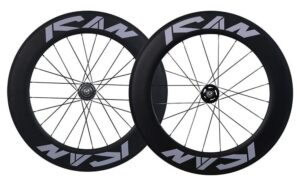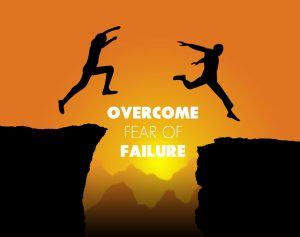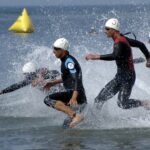In the fourth in my nine-part series exploring obstacles that are blocking your path to your triathlon goals, I introduced you to fear of failure, what I believe is the single greatest barrier to success in our sport. In today’s article, I will show you how to let go of your fear of failure.
Let me preface my thoughts by saying that there are entire books devoted to fear of failure and how to overcome it. Also, in severe cases, psychotherapy is required. As with most things in life, there are no magic pills or quick fixes. At the same time, if you have a fear of failure, there are some things you can do to ease or relieve the burden of fear of failure and begin to pursue success rather than avoid failure.
Change Your Perspective on Failure
 For you to begin the process of letting go of your fear of failure, you must recognize that failure is an inevitable—and essential—part of triathlon (and life). It shows you what you did wrong so you can correct the problem in the future. Failure connects your actions with consequences which help you gain ownership of your efforts. Failure teaches you important life skills, such as commitment, patience, perseverance, determination, resilience, and problem solving. It helps you respond positively to the frustration and disappointment that you will often experience as you pursue your goals. Failure also teaches you humility and appreciation for the opportunities that you’re given as a triathlete.
For you to begin the process of letting go of your fear of failure, you must recognize that failure is an inevitable—and essential—part of triathlon (and life). It shows you what you did wrong so you can correct the problem in the future. Failure connects your actions with consequences which help you gain ownership of your efforts. Failure teaches you important life skills, such as commitment, patience, perseverance, determination, resilience, and problem solving. It helps you respond positively to the frustration and disappointment that you will often experience as you pursue your goals. Failure also teaches you humility and appreciation for the opportunities that you’re given as a triathlete.
Of course, too much failure will discourage you. It will cause you to question your abilities and your goals. It will hurt your motivation and your confidence. Too much failure can create stress and anxiety and cause you to focus too much on the results you’re not getting. As a consequence, you also need to experience success for its ability to bolster motivation, build confidence, reinforce hard work, and increase enjoyment. As you pursue your triathlon goals, you must experience a healthy balance of success and failure to gain the most from your efforts.
Reality Test Your Perceptions
Fear of failure is about the perceptions that you hold about failure and the dire consequences that you believe will occur if you fail. But those perceptions are most likely are entirely disconnected from the reality of your life. You may perceive that bad things will happen if you fail, but, in all likelihood, nothing particularly bad, aside from some disappointment, will result from a failure.
For example, the main causes of fear of failure include disappointing others, being perceived by others as a failure, and having to conclude that all of your efforts have been a waste of time. Yet, I’m going to argue that none of these things will happen. You can challenge these perceptions by asking your family and friends if they will be disappointed in you (or, as a result, love you less), You can recognize all of the wonderful experiences and important life lessons you will have learned that will benefit you in your life. So, I encourage you to reality test those perceptions and find out if your fears will come true (I’m pretty sure they won’t).
friends if they will be disappointed in you (or, as a result, love you less), You can recognize all of the wonderful experiences and important life lessons you will have learned that will benefit you in your life. So, I encourage you to reality test those perceptions and find out if your fears will come true (I’m pretty sure they won’t).
Get Support from Others
Fear of failure is a difficult obstacle to overcome on your own, so enlist family, friends, coaches, and teammates to help you get over the top. Have them encourage you when you get discouraged, challenge your thinking when you go to the dark side, provide levity when things get heavy for you, and give you hope when you don’t see any. With many people behind you, you will feel more confident, stronger, and better prepared to face your fears and pursue your triathlon goals.
Be Cautiously Optimistic
 ]If you have a fear of failure, I don’t think I can get you to be overwhelmingly optimistic (“Everything will turn out great!”), at least not right away. But if you can be cautiously optimistic (“Good things could happen.”), you’ve taken a big step in the right direction. Being cautiously optimistic involves seeing a small ray of hope when you would otherwise see gloom and doom. It means acknowledging that bad things could happen while, at the same time, also recognizing the many good things are more likely to happen. Cautious optimism means giving yourself a small chance of being successful which opens the door to more hope, confidence, and even more optimism with every opportunity you give yourself.
]If you have a fear of failure, I don’t think I can get you to be overwhelmingly optimistic (“Everything will turn out great!”), at least not right away. But if you can be cautiously optimistic (“Good things could happen.”), you’ve taken a big step in the right direction. Being cautiously optimistic involves seeing a small ray of hope when you would otherwise see gloom and doom. It means acknowledging that bad things could happen while, at the same time, also recognizing the many good things are more likely to happen. Cautious optimism means giving yourself a small chance of being successful which opens the door to more hope, confidence, and even more optimism with every opportunity you give yourself.
Take Risks
The very nature of triathlon is that you cannot perform your best without taking risks. You won’t find real success unless you put it on the line. The problem is that when you take risks, you may fail. But, if you don’t take risks, you are guaranteed to not perform your best, which is the worst kind of failure.
I encourage you to make a commitment to taking risks for two reasons. First, to show you that you will be okay if you do fail. Second, to show you that when you take risks, good things will often happen (though not always, of course). You should start small with your risk taking, for example, in training where the consequences of failure are minimal (e.g., try running intervals at a pace that is faster than what you think you can do), and slowly intensify your risk taking in increasingly more important races. In doing so, you get comfortable with taking risks, see that the downsides aren’t so down, and the upsides are really up.
get comfortable with taking risks, see that the downsides aren’t so down, and the upsides are really up.
Take Your Shot
Your most basic goal on race day is to simply take your shot, meaning give it everything you have. Taking your shot is inherently risky, but it is far better to take your shot and “fail” (in quotes because when you give your best effort, that is a success regardless of the what the results say) than to never take your shot at all (that’s the real failure!). There’s a quote from Michael Jordan poster that says something like, “I’ve missed more than 9000 shots in my career. I’ve lost almost 300 games. 26 times, I’ve been trusted to take the game winning shot and missed. I’ve failed over and over and over again in my life. And that is why I succeed.” All those misses didn’t prevent him from continuing to take his shot and hitting far more buzzer beaters than he missed. And there is one simple fact here: If you don’t take your shot, you guarantee that you will fail.
 The great thing about all of these steps to overcome fear of failure is that they build on each other. The more you challenge your fear of failure, the more you see that your fear is unfounded and unnecessary. And, as you do so, you will learn two important lessons. First, failure is fleeting, and you will long outlive it. Second, when you let go of your fear of failure, you will perform better and be more successful than ever.
The great thing about all of these steps to overcome fear of failure is that they build on each other. The more you challenge your fear of failure, the more you see that your fear is unfounded and unnecessary. And, as you do so, you will learn two important lessons. First, failure is fleeting, and you will long outlive it. Second, when you let go of your fear of failure, you will perform better and be more successful than ever.
Your goal is to develop a new perspective on failure that takes away its fear. A healthier relationship with failure will free you to strive for success without reservation, take risks, and vigorously pursue their triathlon dreams. In time, you will come to know in your heart that some failure is not only okay, but also essential to your triathlon efforts, and in no way a negative judgment on your goals or a poor reflection on you as a triathlete or a person. In fact, your ability to persevere in the face of failure says far more about you than how you respond to success in our sport. If you can develop a healthy relationship with failure, you will be afforded a much better chance of success and satisfaction in your triathlon life.
Do you want to take the next step in training your mind to perform your best in training and on race day? Here are four options for you:
- Read my latest mental training book: Train Your Mind for Athletic Success: Mental Preparation to Achieve Your Sports Goals.
- Listen to my Train Your Mind for Athletic Success
- Take a look at myonline mental training courses.
- Schedule a 1:1 session with me.







